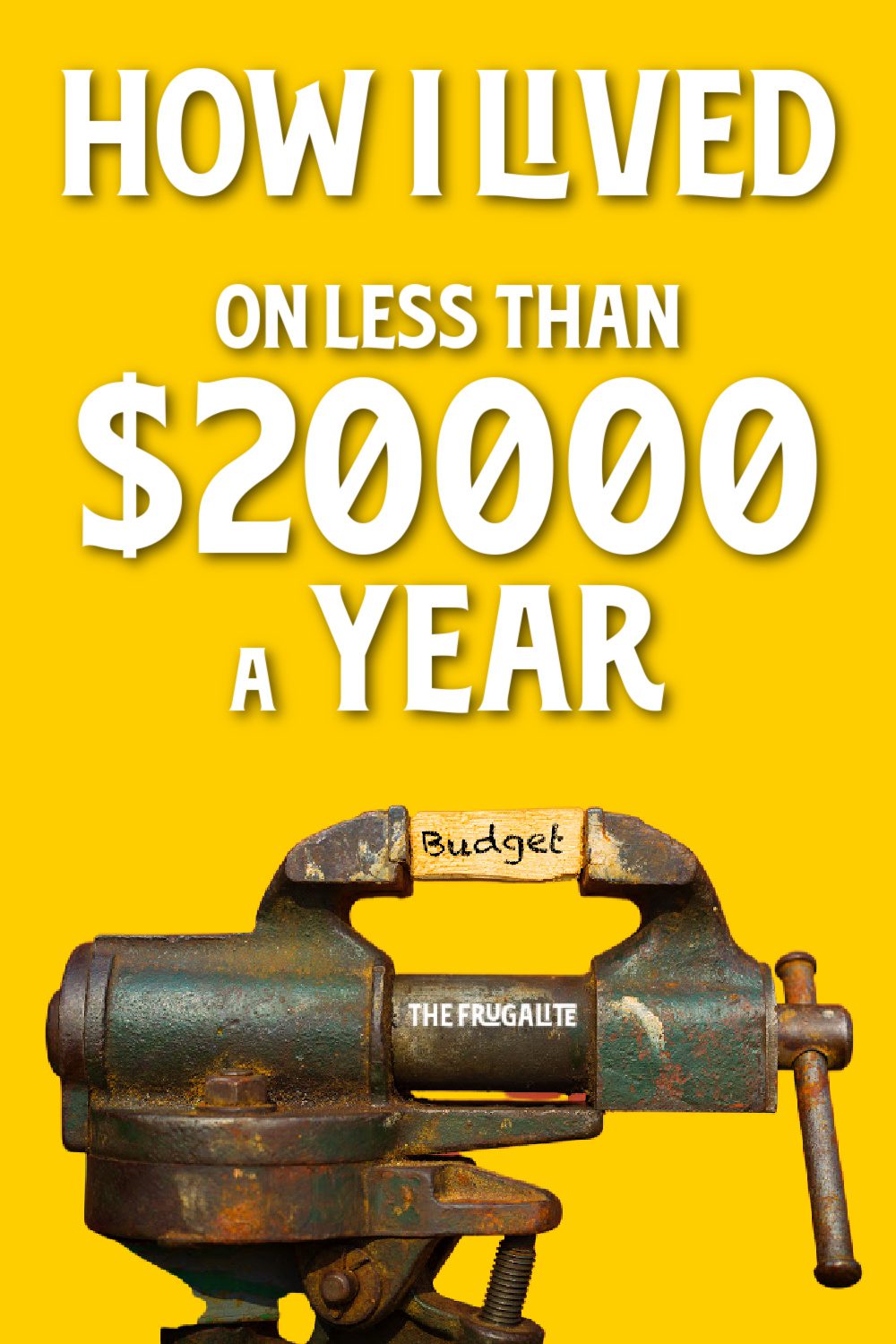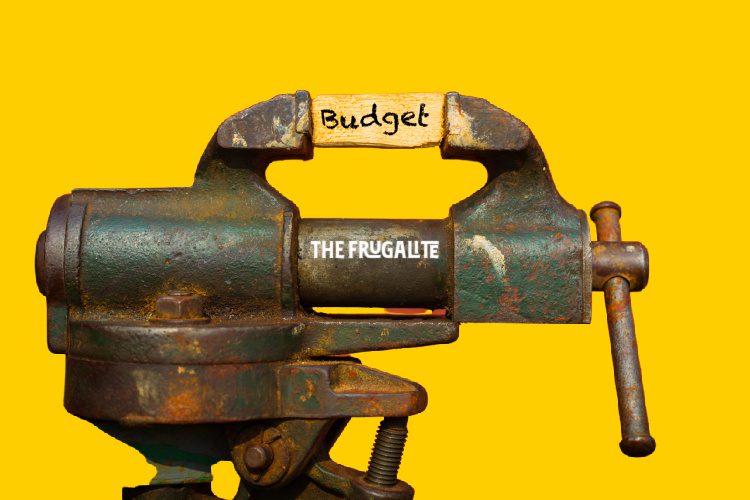(Psst: The FTC wants me to remind you that this website contains affiliate links. That means if you make a purchase from a link you click on, I might receive a small commission. This does not increase the price you’ll pay for that item nor does it decrease the awesomeness of the item. ~ Daisy)
By the author of What School Should Have Taught You
It was my first year out on my own. I was done with high school, done with college, and officially in my own place that wasn’t a dorm room or a home filled with roommates. I can remember being super excited when my first bill arrived in the mail.
“I’m an adult,” I thought.
That sense of excitement over a mailbox full of bills has since passed.
Though it was years ago, if I remember correctly, we somehow made it off of less than $20,000 that first year. I don’t remember the exact figure for income that year (I want to say it was around $17,000), but the point is that we made it through Year 1 without starving to death or ending up living in an alleyway somewhere.
Considering that inflation is absolutely wrecking the American wallet at the moment and that we’re all feeling the need to cut back on expenses, I thought it might be of benefit to take a look back at some of the practical things that helped me to make it through Year 1.
Every single dollar was tracked.
Literally down to the penny. I knew every dollar that we brought in each month, where it came from, and where it went. I did this with a pretty detailed Excel workbook.
Money was told where to go.
There’s something to be said for this. If you don’t tell your money where to go, it’ll wander off, and then you’ll wonder where it went.
At the beginning of every month, cash was taken out of the bank and put into the envelope system. I had an envelope for clothes, for gas, for food, for fun, for my phone bill – there was an envelope for everything.
Once the money for that envelope was gone, there was nothing more to spend there. I told my money where to go, and it didn’t wander off.
I always knew exactly how much money was in the bank.
This helped to keep me from spending money I didn’t have. If I knew that the bank account was running low, I knew that I really shouldn’t spend money on things.
The main way that I did this was by checking my budget on a weekly basis. Every Friday was budget day. I sat down and figured out what had been spent that week, what had been earned, and how much was left in the bank.
Money is a huge part of life. You have to be responsible with it, or you can end up getting yourself into a quite unpleasant hole.
Knowing how much money you have in the bank all the time helps to ensure that you stay away from digging yourself into a debt pit.
I never used debit or credit cards.
Other than for gas, every single purchase I made was with cash. I hated going into the gas station to ask for $20 on pump 3 (remember when $20 could fill a tank?), so, I used a credit card for gas.
Literally, every other purchase was with cash. If I was going to Lowe’s, I carried cash with me. Once the cash was gone, the ability to make a purchase was gone. I never cheated myself on this. If there was no cash, there was no purchasing power, and that was that.
Fun money was still a thing.
One of the things that my dad always taught me was that it’s perfectly fine to watch your money like a hawk, but you do still have to use some of it for fun stuff. If you don’t ever use money for fun stuff, one of a few things will happen.
Number one, you’ll end up depressed. There are always going to be things that catch your eye, and if you tell yourself no all the time to these purchases, you’ll be depriving yourself consistently of a bit of temporary happiness with no real reason behind it.
Number two, you won’t be any fun to hang around. If you constantly say no every time that your friends ask if you want to go out to a movie or get something to eat, eventually, they’re going to quit asking.
Money can be enjoyed responsibly.
The way that we did this was by granting $25/month of “fun money.” This money could literally be spent on anything. Coffee, tools, books – it didn’t matter. That money was doled out as cash at the beginning of the month.
But once that money was gone, that money was gone. There was no spending money on fun stuff once the fun money was gone, and that was the rule. No exceptions.
You have $25 this month but want to spend $30 on a bench plane at the flea market? Then you better hope that they still have it next month because the rule is $25 a month. It was tough – it took discipline – but that’s part of adulting.
The budget is a living thing.
This was another thing that my dad taught me when I was a teenager. The budget is a living, breathing thing. Even if you are as strict as possible with your envelope system, there are times when something is going to wreck your budget.
(A lot of the other advice my dad taught me can be found in my new book What School Should Have Taught You.)
You may have a car repair fund that gets overdrawn. When that happens, you’re going to have to cannibalize the clothes budget for that month. While not ideal, that’s okay. The budget is alive, in a sense. Just because something doesn’t go to plan that month, don’t let it wreck your mindset.
Life happens. Be flexible.
These were the main things that I did to help make it so that living off of $20,000/year was possible. There were other significant variables too, of course, but these above ones are some of the main things that made that type of budget possible.
I’m not entirely sure if it’s still possible to live on that small amount of money within the United States. This was several yeas ago. But, I have no hesitation in saying that if you incorporate some of these basic principles into your life, they can help out your budget as well.
But what are your thoughts? Have you ever lived on a really tight budget? What were some of the things that helped you through it? Tell us in the comments below.
(Aden isn’t a financial adviser, and none of this is financial advice.)
About Aden
Aden Tate is a regular contributor to TheOrganicPrepper.com and TheFrugalite.com. Aden runs a micro-farm where he raises dairy goats, a pig, honeybees, meat chickens, laying chickens, tomatoes, mushrooms, and greens. Aden has four published books, The Faithful Prepper, What School Should Have Taught You, An Arm and a Leg, The Prepper’s Guide to Post-Disaster Communications, and Zombie Choices. You can find his podcast The Last American on Preppers’ Broadcasting Network.















7 thoughts on “How I Lived on Less Than $20,000 a Year”
We’ve been married over 40 years now and have always lived on one income. Hubby worked, I stayed home and raised the kids and took care of almost everything else around the house.
We were never one of those steak and champagne people.
We’re hamburgers and beer people, so no fancy foods or eating out. I cooked from scratch. Still do.
Coupons coupons coupons were a lifesaver back then. Now its all digital or you can only find baby or health and beauty coupons. You used to be able to cut out coupons for fresh produce and stores would have their own coupons for meat and things. Not anymore.
Living cheaply and on one income we’re managed to pay off the mortgage and all the vehicles.
When we first got married, I had $35 a week for groceries, and that included diapers for the baby.We ate very well thanks to the nutrition classes I had in high school. We didn’t need to go to the movies or bars or such. We were happy going camping, or fishing, or swimming, or sled riding in the winter or renting movies or getting them for free at the library.
We also bought the majority of our clothes from thrift stores. Underware,socks and shoes we bought new.
Now we’re living on a third of our usual income since we’re retired. Its like when we first got married. lol
My small family of three survives quite well on 11.000 a year. Frugality has its rewards. And having no debt really helps.
My small family of three thrives on 11.000 a year. Frugality has its rewards and having no debt is good as well.
Moderation? Wow….
Anyone on Social Security lives on less than $20,000. My saving grace has been a reverse mortgage so my housing expense is reduced to taxes and insurance. That allows me to live comfortably, but still frugally and has provided an emergency fund that I absolutely don’t touch otherwise. I don’t go to movies or other pricey entertainment and rarely eat out. I get movies from the library, but usually can find something on TV to watch (I have like 500 channels, after all!). I feel blessed compared to many my age or families trying to make ends meet.
If you’re single, get roommates. I remember all the ways I cut corners back when I was putting myself through college, but roommates was the biggest moneysaver. That was a great way to cut down on rent and utilities.
When – the last year or few or decades ago? Kids? Health/dental/vision insurance (employer sponsored or self-insured)? Where – in a state that provides little assistance to the general population? All of the above makes a big difference, possibly a huge difference. I am all for living within, if not below, ones means. Easier said then done these days depending on ones circumstances. Pulling in a six figure salary when ones spouse is on Medicare is far different than making mid-five figures with kids, regardless of spouse’s income.
There is no such thing as a free lunch and depending on the state in which you reside, their may/may not be a “lifesaver” for those who “did things right”.